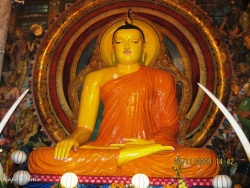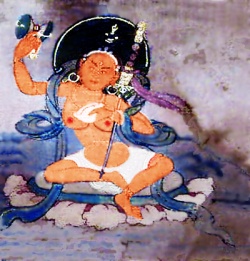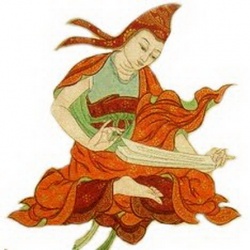Difference between revisions of "Upacālāsuttaṁ: The Discourse about Upacālā"
(Created page with "<nomobile>{{DisplayImages|1806|2436|1439|1616|483|3987|1696|3849}}</nomobile> {{Centre|<big><big>Upacālāsuttaṁ<br/> The Discourse about Upacālā </big></big>}} <poem...") |
|||
| Line 1: | Line 1: | ||
| − | <nomobile>{{DisplayImages|1806|2436|1439|1616|483|3987|1696 | + | <nomobile>{{DisplayImages|1806|2436|1439|1616|483|3987|1696}}</nomobile> |
{{Centre|<big><big>[[Upacālāsuttaṁ]]<br/> | {{Centre|<big><big>[[Upacālāsuttaṁ]]<br/> | ||
The Discourse about Upacālā </big></big>}} | The Discourse about Upacālā </big></big>}} | ||
| Line 7: | Line 7: | ||
Thus I have heard: | Thus I have heard: | ||
| − | ekaṁ samayaṁ Bhagavā Sāvatthiyaṁ viharati | + | ekaṁ samayaṁ [[Bhagavā]] Sāvatthiyaṁ viharati |
| − | at one time the Gracious One was dwelling near Sāvatthī | + | at one time the Gracious One was dwelling near [[Sāvatthī]] |
| − | Jetavane Anāthapiṇḍikassa ārāme. | + | [[Jetavane]] Anāthapiṇḍikassa ārāme. |
| − | at Anāthapiṇḍika's grounds in Jeta's Wood. | + | at Anāthapiṇḍika's grounds in Jeta's [[Wood]]. |
| − | Atha kho Upacālā bhikkhunī, pubbaṇhasamayaṁ nivāsetvā, | + | Atha kho [[Upacālā]] [[bhikkhunī]], pubbaṇhasamayaṁ nivāsetvā, |
| − | Then the nun Upacālā, having dressed in the morning time, | + | Then the [[nun]] [[Upacālā]], having dressed in the morning time, |
pattacīvaram-ādāya, Sāvatthiṁ piṇḍāya pāvisi. | pattacīvaram-ādāya, Sāvatthiṁ piṇḍāya pāvisi. | ||
| − | after picking up her bowl and robe, was entering Sāvatthī for alms. | + | after picking up her [[bowl]] and robe, was entering [[Sāvatthī]] for [[alms]]. |
Sāvatthiyaṁ piṇḍāya caritvā, pacchābhattaṁ piṇḍapātapaṭikkantā, | Sāvatthiyaṁ piṇḍāya caritvā, pacchābhattaṁ piṇḍapātapaṭikkantā, | ||
| − | After walking for alms in Sāvatthī, and returning from the alms-round after the meal, | + | After walking for [[alms]] in [[Sāvatthī]], and returning from the [[alms-round]] after the meal, |
yena Andhavanaṁ tenupasaṅkami divāvihārāya, | yena Andhavanaṁ tenupasaṅkami divāvihārāya, | ||
| − | she approached the Blind Man's Wood to pass the day, | + | she approached the [[Blind]] Man's [[Wood]] to pass the day, |
Andhavanaṁ ajjhogahetvā, | Andhavanaṁ ajjhogahetvā, | ||
| − | and having entered Blind Man's Wood, | + | and having entered [[Blind]] Man's [[Wood]], |
aññatarasmiṁ rukkhamūle divāvihāraṁ nisīdi. | aññatarasmiṁ rukkhamūle divāvihāraṁ nisīdi. | ||
| − | she sat down at the root of a certain tree to pass the day. | + | she sat down at the [[root]] of a certain [[tree]] to pass the day. |
| − | Atha kho Māro Pāpimā yena Upacālā bhikkhunī tenupasaṅkami, | + | Atha kho Māro Pāpimā yena [[Upacālā]] [[bhikkhunī]] tenupasaṅkami, |
| − | Then the Wicked Māra approached the nun Upacālā, | + | Then the Wicked [[Māra]] approached the [[nun]] [[Upacālā]], |
upasaṅkamitvā Upacālaṁ bhikkhuniṁ etad-avoca: | upasaṅkamitvā Upacālaṁ bhikkhuniṁ etad-avoca: | ||
| − | and after approaching he said this to the nun Upacālā: | + | and after approaching he said this to the [[nun]] [[Upacālā]]: |
| − | “Kattha nu tvaṁ, bhikkhuni, uppajjitukāmā?” ti | + | “Kattha nu tvaṁ, [[bhikkhuni]], uppajjitukāmā?” ti |
| − | “Where would you, nun, like to be reborn?” | + | “Where would you, [[nun]], like to be [[reborn]]?” |
“Na khvāhaṁ, āvuso, katthaci uppajjitukāmā.” ti | “Na khvāhaṁ, āvuso, katthaci uppajjitukāmā.” ti | ||
| − | “There is nowhere, friend, I would like to be reborn.” | + | “There is nowhere, [[friend]], I would like to be [[reborn]].” |
| − | “Tāvatiṁsā ca Yāmā ca, Tusitā cāpi devatā, | + | “Tāvatiṁsā ca [[Yāmā]] ca, Tusitā cāpi [[devatā]], |
| − | “The Thirty-Three gods, the Restrained gods, also the Satisfied gods, | + | “The Thirty-Three [[gods]], the Restrained [[gods]], also the Satisfied [[gods]], |
| − | Nimmānaratino devā, ye devā Vasavattino, | + | Nimmānaratino [[devā]], ye [[devā]] Vasavattino, |
| − | Those gods who delight in creation, those gods who are Wielding Power, | + | Those [[gods]] who [[delight]] in creation, those [[gods]] who are Wielding Power, |
Tattha cittaṁ paṇidhehi, ratiṁ paccanubhossasī.” ti | Tattha cittaṁ paṇidhehi, ratiṁ paccanubhossasī.” ti | ||
| − | To those places direct your mind, there you will experience delight.” | + | To those places direct your [[mind]], there you will [[experience]] [[delight]].” |
| − | “Tāvatiṁsā ca Yāmā ca, Tusitā cāpi devatā, | + | “Tāvatiṁsā ca [[Yāmā]] ca, Tusitā cāpi [[devatā]], |
| − | “The Thirty-Three gods, the Restrained gods, also the Satisfied gods, | + | “The Thirty-Three [[gods]], the Restrained [[gods]], also the Satisfied [[gods]], |
| − | Nimmānaratino devā, ye devā Vasavattino, | + | Nimmānaratino [[devā]], ye [[devā]] Vasavattino, |
| − | Those gods who delight in creation, those gods who are Wielding Power, | + | Those [[gods]] who [[delight]] in creation, those [[gods]] who are Wielding Power, |
Kāmabandhanabaddhā te enti Māravasaṁ puna. | Kāmabandhanabaddhā te enti Māravasaṁ puna. | ||
| − | Those bound by sensual-bondage come to Māra's power again. <ref>{{Nolinking|Comm: enti Māravasaṁ punā ti punappunaṁ Maraṇamārakilesamāradevaputtamārānaṁ vasaṁ āgacchanti;}} come to Māra's power again means again and again they come under the power of Māra as death, Māra as defilements, Māra (personified) as the godly son.</ref> | + | Those [[bound]] by sensual-bondage come to [[Māra's]] power again. <ref>{{Nolinking|Comm: enti Māravasaṁ punā ti punappunaṁ Maraṇamārakilesamāradevaputtamārānaṁ vasaṁ āgacchanti;}} come to [[Māra's]] power again means again and again they come under the power of [[Māra]] as [[death]], [[Māra]] as [[defilements]], [[Māra]] (personified) as the godly son.</ref> |
Sabbo ādīpito loko, sabbo loko padhūpito, | Sabbo ādīpito loko, sabbo loko padhūpito, | ||
| − | The whole of the world is in flames, the whole of the world is blazing, <ref>{{Nolinking|Comm: padhūpito ti santāpito; blazing means burning.}}</ref> | + | The whole of the [[world]] is in flames, the whole of the [[world]] is blazing, <ref>{{Nolinking|Comm: padhūpito ti santāpito; blazing means burning.}}</ref> |
| − | Sabbo pajjalito loko, sabbo loko pakampito. | + | Sabbo pajjalito loko, [[sabbo loko pakampito]]. |
| − | The whole of the world is burning, the whole of the world is shaking. | + | The whole of the [[world]] is burning, the whole of the [[world]] is shaking. |
Akampitaṁ ajalitaṁ, aputhujjanasevitaṁ, | Akampitaṁ ajalitaṁ, aputhujjanasevitaṁ, | ||
| − | Not shaken, not burning, not associating with worldly folk, | + | Not shaken, not burning, not associating with [[worldly]] {{Wiki|folk}}, |
| − | Agati yattha Mārassa: tattha me nirato mano.” ti | + | [[Agati]] yattha Mārassa: tattha me nirato [[mano]].” ti |
| − | Not going back to Māra's (realm): <ref>{{Nolinking|Comm: agati yattha Mārassā ti yattha tuyhaṁ Mārassa agati;}} not going back to Māra's (realm) means you are not going back to that place where Māra is.</ref> (for) there <ref>{{Nolinking|Comm: tatthā ti tasmiṁ Nibbāne;}} there means in that place, in Emacipation. This seems a little awkward, presumably she means to say: having attained Emacipation my mind does not delight in Māra's realm.</ref> my mind does not delight.” | + | Not going back to [[Māra's]] ([[realm]]): <ref>{{Nolinking|Comm: agati yattha Mārassā ti yattha tuyhaṁ Mārassa agati;}} not going back to [[Māra's]] ([[realm]]) means you are not going back to that place where [[Māra]] is.</ref> (for) there <ref>{{Nolinking|Comm: tatthā ti tasmiṁ Nibbāne;}} there means in that place, in Emacipation. This seems a little awkward, presumably she means to say: having [[attained]] Emacipation my [[mind]] does not [[delight]] in [[Māra's]] [[realm]].</ref> my [[mind]] does not [[delight]].” |
| − | Atha kho Māro Pāpimā: | + | Atha kho Māro Pāpimā: “[[Jānāti]] maṁ [[Upacālā]] [[bhikkhunī]]!” ti |
| − | Then the Wicked Māra (thought): “The nun Upacālā knows me!” | + | Then the Wicked [[Māra]] ([[thought]]): “The [[nun]] [[Upacālā]] [[knows]] me!” |
dukkhī dummano tatthevantaradhāyī ti. | dukkhī dummano tatthevantaradhāyī ti. | ||
| − | and pained and depressed he vanished right there. | + | and pained and {{Wiki|depressed}} he vanished right there. |
</poem> | </poem> | ||
Revision as of 13:35, 16 May 2015
Upacālāsuttaṁ
The Discourse about Upacālā
168. Evaṁ me sutaṁ:
Thus I have heard:
ekaṁ samayaṁ Bhagavā Sāvatthiyaṁ viharati
at one time the Gracious One was dwelling near Sāvatthī
Jetavane Anāthapiṇḍikassa ārāme.
at Anāthapiṇḍika's grounds in Jeta's Wood.
Atha kho Upacālā bhikkhunī, pubbaṇhasamayaṁ nivāsetvā,
Then the nun Upacālā, having dressed in the morning time,
pattacīvaram-ādāya, Sāvatthiṁ piṇḍāya pāvisi.
after picking up her bowl and robe, was entering Sāvatthī for alms.
Sāvatthiyaṁ piṇḍāya caritvā, pacchābhattaṁ piṇḍapātapaṭikkantā,
After walking for alms in Sāvatthī, and returning from the alms-round after the meal,
yena Andhavanaṁ tenupasaṅkami divāvihārāya,
she approached the Blind Man's Wood to pass the day,
Andhavanaṁ ajjhogahetvā,
and having entered Blind Man's Wood,
aññatarasmiṁ rukkhamūle divāvihāraṁ nisīdi.
she sat down at the root of a certain tree to pass the day.
Atha kho Māro Pāpimā yena Upacālā bhikkhunī tenupasaṅkami,
Then the Wicked Māra approached the nun Upacālā,
upasaṅkamitvā Upacālaṁ bhikkhuniṁ etad-avoca:
and after approaching he said this to the nun Upacālā:
“Kattha nu tvaṁ, bhikkhuni, uppajjitukāmā?” ti
“Where would you, nun, like to be reborn?”
“Na khvāhaṁ, āvuso, katthaci uppajjitukāmā.” ti
“There is nowhere, friend, I would like to be reborn.”
“Tāvatiṁsā ca Yāmā ca, Tusitā cāpi devatā,
“The Thirty-Three gods, the Restrained gods, also the Satisfied gods,
Nimmānaratino devā, ye devā Vasavattino,
Those gods who delight in creation, those gods who are Wielding Power,
Tattha cittaṁ paṇidhehi, ratiṁ paccanubhossasī.” ti
To those places direct your mind, there you will experience delight.”
“Tāvatiṁsā ca Yāmā ca, Tusitā cāpi devatā,
“The Thirty-Three gods, the Restrained gods, also the Satisfied gods,
Nimmānaratino devā, ye devā Vasavattino,
Those gods who delight in creation, those gods who are Wielding Power,
Kāmabandhanabaddhā te enti Māravasaṁ puna.
Those bound by sensual-bondage come to Māra's power again. [1]
Sabbo ādīpito loko, sabbo loko padhūpito,
The whole of the world is in flames, the whole of the world is blazing, [2]
Sabbo pajjalito loko, sabbo loko pakampito.
The whole of the world is burning, the whole of the world is shaking.
Akampitaṁ ajalitaṁ, aputhujjanasevitaṁ,
Not shaken, not burning, not associating with worldly folk,
Agati yattha Mārassa: tattha me nirato mano.” ti
Not going back to Māra's (realm): [3] (for) there [4] my mind does not delight.”
Atha kho Māro Pāpimā: “Jānāti maṁ Upacālā bhikkhunī!” ti
Then the Wicked Māra (thought): “The nun Upacālā knows me!”
dukkhī dummano tatthevantaradhāyī ti.
and pained and depressed he vanished right there.
Footnotes
- ↑ Comm: enti Māravasaṁ punā ti punappunaṁ Maraṇamārakilesamāradevaputtamārānaṁ vasaṁ āgacchanti; come to Māra's power again means again and again they come under the power of Māra as death, Māra as defilements, Māra (personified) as the godly son.
- ↑ Comm: padhūpito ti santāpito; blazing means burning.
- ↑ Comm: agati yattha Mārassā ti yattha tuyhaṁ Mārassa agati; not going back to Māra's (realm) means you are not going back to that place where Māra is.
- ↑ Comm: tatthā ti tasmiṁ Nibbāne; there means in that place, in Emacipation. This seems a little awkward, presumably she means to say: having attained Emacipation my mind does not delight in Māra's realm.






